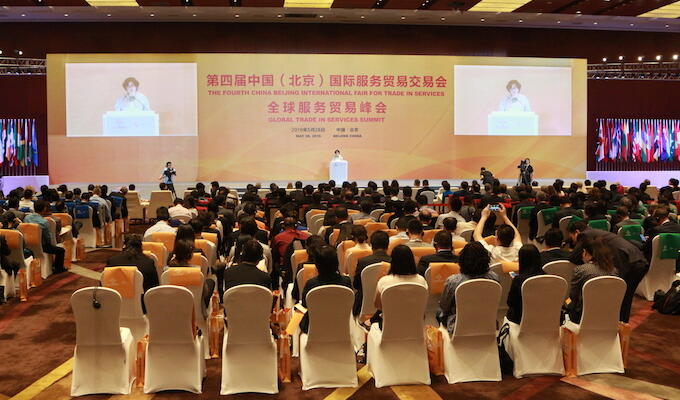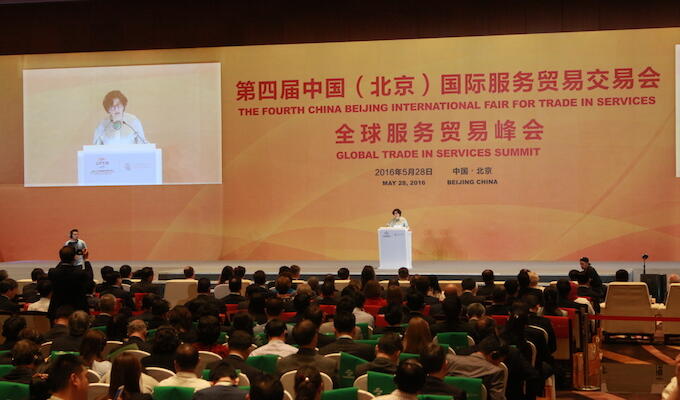

Opening ceremony CIFTIS Global Trade in Services Summit
28 May 2016 - Beijing - China
Distinguished Minister Gao, Mayor Wang, DDG Yi, DSG Kiviniemi, honourable guest, ladies and gentleman,
ITC, the joint development agency of the United Nations and the World Trade Organisation, is very pleased to be one of the international partner agencies of the China International Fair for Trade in Services.
Innovation is the engine for services growth
We’re living in an age of innovation and much of the world’s innovation is happening in the services industries.
In fact, innovation is the fundamental driving force for services. Compared with agriculture and manufacturing, demand for services are much more personalized. Diverse, personalized and rapidly evolving demands can only be fulfilled by constant innovation. This pushes services companies to constantly upgrade their offerings to better cater to the consumer demands, resulting in a vibrant and dynamic global services market.
Imagine ourselves in this same meeting room 10 years ago, we may notice that what has changed within the past decade has been primarily driven by innovation in various services sectors. Design services have changed peoples style from head to toes, ICT services have put in our hands these little gadgets capable of taking pictures and instant messaging, and even conferences themselves have evolved from simply providing a place for people to meet into a major services industry know as MICE (Meetings, incentives, conferencing, exhibitions). Services innovation is changing every aspect of our life.
Services innovation has shaped our past and is also going to define our future, particularly the future of globalization. By conventional metrics, globalization is stalling. The global goods trade has flattened and cross-border capital flows have declined since 2008. This, however, has not taken into account the surge of global services trade, embodied increasingly in the digital flows across border.
The McKinsey report on Digital Globalization shows that digital flows—which were practically non-existent just 15 years ago—now exert a larger impact on GDP growth than the centuries-old trade in goods. In 2014, the combined effect all types of cross-border flows, including goods, services, data and capital, has raised world GDP by $7.8 trillion, and data flows along account for over 20% or $2.8 trillion of this impact.
Information technology has transformed the way we live, work and play. It has also completely redefined success of businesses. Ten years ago, Uber, AirBnB, Xiaomi, Snapchat, Pinterest would be meaningless strange-sounding word combinations. Today, they are known around the world as the “tech unicorns” that are valued at billions of dollars.
Challenges and opportunities for SMEs and governments
All companies, particularly SMEs, are under constant pressure to innovate to meet changing demand. New business solutions and new business models emerge every day. Without innovation, even the greatest companies today may have to face their destiny in just a couple of years.
But services innovation also offers great opportunities, especially for SMEs. A decade ago, e-commerce only catered to the tech savvy adventurers and international e-commerce was negligible. Today, around 12 percent of the global goods trade is conducted via international e-commerce, and SMEs are the largest group in this new type of trade.
Nowhere else is this more evident than in tech-based start-ups. Almost all tech start-ups now, regardless whether they are in developed or developing countries, are born global from day one, thanks to the innovations in connectivity and knowledge sharing. The average time for building a billion dollar “unicorn” company is only six years, whereas traditionally it took decades.
But services and innovation do not happen in a vacuum. They can only evolve in an enabling business environment shaped by conducive policies. These policies could range from fundamentals such as the rule of law, protection of property right and intellectual property, access to knowledge and information, cultivation of entrepreneurship and investment in training and education, to more specific policies focusing on spurring innovation such as incentives for transforming research work into practical applications, taxation preferences and financing options for startup companies, science and high-tech park that facilitate formulation of innovation clusters.
In a rapidly evolving services economy, governments also need to innovate their regulatory philosophy and regulatory practices. To know what companies need and provide matching policies and initiatives is key to fostering competitive services sectors.
Services innovation and China’s structural reform
Services innovation is particularly relevant for China. China is now at a critical juncture to change its growth strategies. The recent years saw slight decreases in China’s GDP growth, but the job market remains vibrant and unemployment rate is low. This largely thanks to the growth of the services sector, which has surpassed 50% of China’s GDP in 2015, and has become the major driver for economic prosperity and job creation.
This significant transformation shows that the country is on the right path of reform, from an export and investment driven economy to a sustainable innovation and domestic consumption driven economy. Knowledge and skill intensive services sectors are playing an increasingly important role for China’s economy.
As the income of the Chinese families rise, demand for high quality products and increasingly, high quality services is also on the rise. This pushes companies to improve and innovate to cater to the demands of the consumers. The supply side structural reform and the internet plus strategy implemented by the Chinese government, is all about enhancing this trend, upgrading the supply capacity of the firms to offer better products and services and let market play the decisive role in resource allocation and thus drive companies to innovate.
China is already a frontrunner in many aspects of services innovation, particularly in consumer services, fintec and e-commerce. China is now the world’s largest online consumer market. Estimates show that China’s retail e-commerce is almost twice as large as the second largest market. This huge market could offer great opportunities for companies around the world, including the SMEs that traditionally had no means to sell to the Chinese market.
China is also investing in improving international connectivity. The one belt one road initiative helps to reduce trade costs and could improve business prospects from Papua New Guinea to Portugal. The 10,000 kilometre new Silk Road railway (Yu Xin Ou) shortens the transit time between Europe and China to less than 20 days, and costs only one third as much as air freight.
ITC’s role in promoting global services trade
At the ITC, we aim to help SMEs in developing countries to gain greater access to the international market. We support SME competitiveness with better market information, enhanced management and technical skills and foster SME innovation through improved access to knowledge.
On services trade, we work with the governments, trade and investment support institutions and SMEs to expand developing country services export. Our IT and tourism projects have helped SMEs in Bangladesh, Uganda, Kenya, Myanmar, Cambodia and many other developing countries to improve their services offerings and to reach out to the global customers. Our e-solutions project help SMEs to expand export through e-commerce, and our capacity building projects on trade negotiation help policy makers to better understand trade rules and best practices in services regulation.
ITC is delighted to be an international partner agency of the CIFTIS. CIFTIS is a great event in global services trade that helps to connect services businesses around the world with their potential clients and business partners. It is also a great event to share information and to discuss the latest developments in the world services trade.
This afternoon, we’ll host a joint forum with the B20 on global e-commerce policies. We’ll also launch a new publication on Cross-border e-commerce for SMEs. ITC has also facilitated the participation of 40 companies from around the world to participate in the CIFTIS and explore business opportunities in the Chinese market.
China is an important partner for ITC and ITC stands ready to work together with the government of China to promote global services trade and help developing countries to achieve more sustainable and inclusive development.
Thank you



